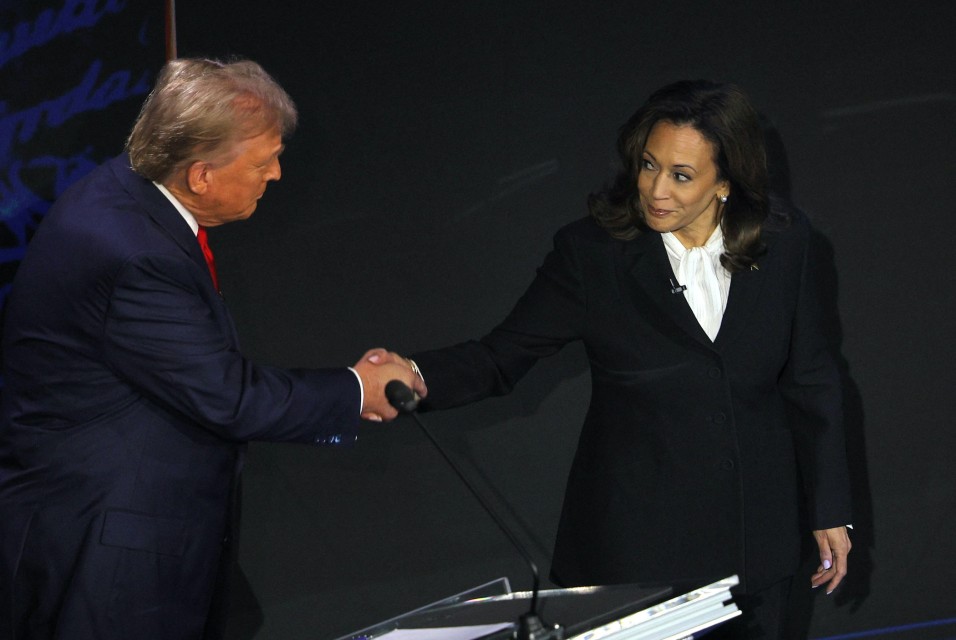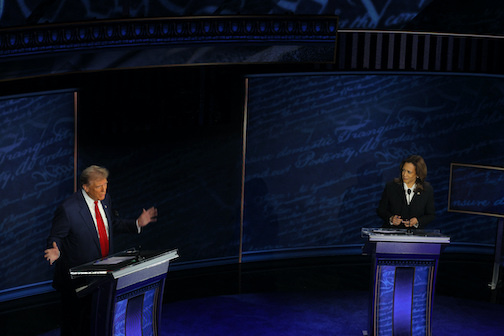
By Nandita Bose, Gram Slattery and Joseph Ax
PHILADELPHIA (Reuters) – Republican Donald Trump and Democratic Vice President Kamala Harris immediately went on the offensive in the opening segment of their first presidential debate on Tuesday, each seeking a campaign-altering moment in their closely fought election.
Harris, 59, attacked Trump’s intention to impose high tariffs on foreign goods – a proposal she has likened to a sales tax on the middle class – while touting her plan to offer tax benefits to families and small businesses.
“Donald Trump left us the worst unemployment since the Great Depression,” Harris said, referring to his years as president from 2017-2021. Unemployment peaked at 14.8% in April 2020 and at 6.4% when he left office. It was far higher in the Great Depression.
Trump, 78, criticized Harris for the persistent inflation during the Biden administration’s term, though he overstated the level of price increases. He also pivoted quickly to his top issue, immigration, claiming again without evidence that immigrants from “insane asylums” are crossing the U.S. southern border with Mexico.
Inflation, he said, “has been a disaster for people, for the middle class, for every class.”
The debate got under way at 9 p.m. ET (0100 GMT on Wednesday) with a surprise handshake between the two opponents, who had never met before. Harris approached Trump at his lectern, introducing herself by name, in what was the first handshake at a presidential debate since 2016.
With eight weeks to go before the Nov. 5 election, and days until early voting starts in some states, the debate – the only one scheduled – presented both opportunities and risks for each candidate in front of a televised audience of tens of millions of voters.
The encounter is particularly important for Harris, with opinion polls showing that more than a quarter of likely voters feel they do not know enough about her. Harris entered the race only seven weeks ago after President Joe Biden’s exit.
Harris delivered a lengthy attack on abortion limits, speaking passionately about women denied emergency care and victims of incest unable to terminate their pregnancies due to statewide bans that have proliferated since the U.S. Supreme Court eliminated a nationwide right in 2022. Three Trump appointees were in the majority of that ruling.
She also claimed Trump would support a national ban, an assertion Trump called a lie.
Trump, who has sometimes struggled with messaging on abortion, claimed falsely that Harris and Democrats support infanticide, which – as moderator Linsey Davis noted – is illegal in every state.
“As I said, you’re going to hear a bunch of lies,” Harris said.
Harris also sought to tie Trump to Project 2025, a conservative policy blueprint that proposes expanding executive power, eliminating environmental regulations and making it illegal to ship abortion pills across state lines, among other right-wing goals.
Trump retorted that he has “nothing to do” with Project 2025, though some of his advisers were involved in its creation.

FIRST MEETING
Trump, who has spent weeks launching personal attacks on Harris that have included racist and sexist insults, largely avoided insults during the debate’s first 30 minutes. At one point, however, he called her a “Marxist,” drawing an amused expression from Harris.
Trump’s advisers and fellow Republicans have urged him to focus on the high levels of inflation and immigration during Biden’s presidency, though both have dropped dramatically this year.
Presidential debates do not necessarily change voters’ minds, but they can transform the dynamics of a race. Biden’s poor performance against Trump in June led him to abandon his campaign on July 21.
In a contest that could again come down to tens of thousands of votes in a handful of states, even a small shift in public opinion could alter the outcome. The two candidates are effectively tied in the seven battleground states likely to decide the election, according to polling averages compiled by the New York Times.
The 90-minute debate, hosted by ABC News, was taking place at the National Constitution Center in Philadelphia. As agreed by the campaigns, there was no live audience and candidates’ microphones were muted when it was not their turn to speak.
Harris spent days preparing in Pittsburgh, holding mock sessions on a stage with lights to recreate the debate environment.
Trump instead relied on informal chats with advisers, campaign appearances and media interviews to prepare, with former Democratic congresswoman Tulsi Gabbard – who had a memorably hostile exchange with Harris in a Democratic presidential debate in 2019 – offering advice.
On a call with reporters on Monday, Gabbard said Trump would treat Harris the same as any other opponent.
“President Trump respects women and doesn’t feel the need to be patronizing or to speak to women in any other way than he would speak to a man,” she said.
(Reporting by Nandita Bose and Gram Slattery in Philadelphia; Additional reporting by Dan Fastenberg, Helen Coster, James Oliphant, Kanishka Singh, Costas Pitas, Ann Saphir, Andrea Shalal, Tim Reid and Ted Hesson; Writing by Joseph Ax and Andy Sullivan; Editing by Ross Colvin and Howard Goller)








